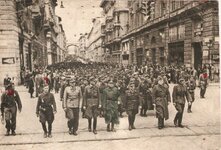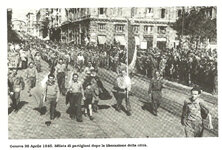- Feb 3, 2024
- LitBits
- 0
New blog post by Eva Ulian – discussions in this thread, please
---
The 25th April is a national holiday here in Italy and it’s called Liberation Day. I had noticed, however, as the years went by, the enthusiasm to celebrate was dwindling a bit and basically I put the cause down to the fact that there seemed to be some confusion among the various sectors of Italian society as to what they were supposed to celebrate as there is no event that stands out in particular that occurred on April 25 1945, for it is in memory of that day that the national holiday was constituted.
It is the events that led up to that date and those immediately after that gives significance to the earmarking of this date. A few months earlier the Americans landed in Normandy and began to take areas previously occupied by Hitler. Meanwhile another army alongside that of the official Italian army was gathering force, that army was called the Resistance and was made up of partisans who spent most of their time hiding on hills and making surprise guerrilla attacks so much so that it vanquished the Nazi-fascist army and liberated Milan and Turin precisely on April 25 1945. Also on that day US forces met USSR troops on Fiume Elba, separating Germany in two.
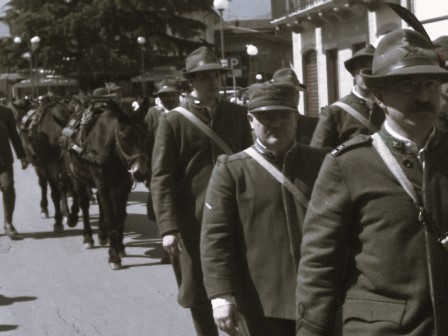
The actual events that marked the final liberation of Italy from German Nazi-Fascism occupation were to follow 3 days later with the capture, shooting of Mussolini and the death of Hitler in his bunker on 30th April. But the event of all events that put an end once and for all to German aggression and Nazism came on 6th August of that year when the first atomic bomb fell on Hiroshima.
However, it makes me smile how Liberation Day in Italy has been interpreted in various ways. Since the Italian Resistance consisted of Partisans who were of socialist and communist extraction and had a significant role in the overthrow of the Fascist occupation, parades and red left wing flags have always been an intrinsic part of the celebrations. Of course the fact that the US troops were the ones who made it possible for the Italians to be free of German Fascism occupation is swept a bit under the carpet since the red flag wavers consider that event as being the beginning of the American occupation- which is not totally wrong- America does indeed occupy Italian soil with its air force, naval and army bases- but that is also swept aside since it is far better to say the US troops have been “invited” to this country rather than having come after the war and have stayed ever since. But who’s complaining? Italy has never had it so good in spite of, rather, because of US “occupation” as some insist on calling it.
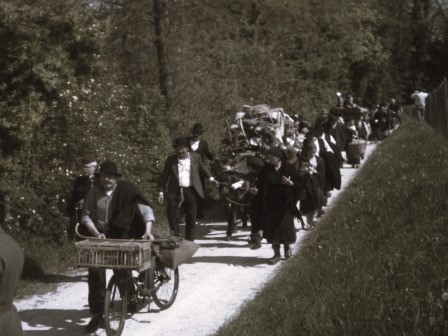
There is very little taught in schools in Italy about the 2nd world war and generations of Italian youth know next to nothing of the anomaly that had hit their country during this period. The official facts of Italy’s involvement in the war are stark and not brilliant. But that was only one side of Italy. There was a war within Italy itself, the unofficial and hidden Italy fighting the official Italy- that side of Italy has barely been set out in books for future generations to read because it is the Italy no one knows about.
The story of this hidden Italy was the story of ordinary men and women who fought against all odds in the Resistance- this much is known- what is not known is that these people were not left alone. If Italy was officially with Germany, with the underground Italy there were the OSS the special services from the USA fighting alongside them to eventual freedom and liberty from Fascism- which is what we celebrate 0n 25th April.
The second world war which was more or less a consequence of the first world war, Hitler waiting in the wings to get his own back, is a phenomenon that structured the last century and infinitely affected the lives of our parents and grandparents.
Even if we are only the children of those who have lived through those harrowing events which scarred the 20th century we too have been influenced by such events, much of the tragedy and senselessness of it was passed on to us only by virtue of living alongside those who had been an integral part of it all- consequently we too have been woven into that atmosphere.
But we are th
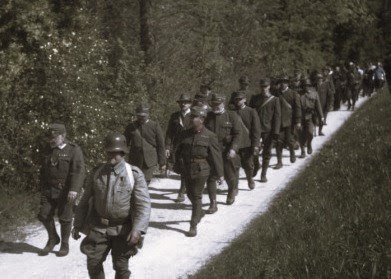 e last generation to claim such. We are the last to remember, for those who come after us will no longer inhabit that atmosphere, have no access to the memory for it will be far gone and faded by then. That’s why we have writers and historians so that reality can be captured and passed on. Historians pass on the facts without which nothing of the past could be pieced together again. Writers, on the other hand, pass on the memory.
e last generation to claim such. We are the last to remember, for those who come after us will no longer inhabit that atmosphere, have no access to the memory for it will be far gone and faded by then. That’s why we have writers and historians so that reality can be captured and passed on. Historians pass on the facts without which nothing of the past could be pieced together again. Writers, on the other hand, pass on the memory.
---
By @Eva Ulian
Get the discussion going – post your thoughts & comments in the thread below…
---
The 25th April is a national holiday here in Italy and it’s called Liberation Day. I had noticed, however, as the years went by, the enthusiasm to celebrate was dwindling a bit and basically I put the cause down to the fact that there seemed to be some confusion among the various sectors of Italian society as to what they were supposed to celebrate as there is no event that stands out in particular that occurred on April 25 1945, for it is in memory of that day that the national holiday was constituted.
It is the events that led up to that date and those immediately after that gives significance to the earmarking of this date. A few months earlier the Americans landed in Normandy and began to take areas previously occupied by Hitler. Meanwhile another army alongside that of the official Italian army was gathering force, that army was called the Resistance and was made up of partisans who spent most of their time hiding on hills and making surprise guerrilla attacks so much so that it vanquished the Nazi-fascist army and liberated Milan and Turin precisely on April 25 1945. Also on that day US forces met USSR troops on Fiume Elba, separating Germany in two.

The actual events that marked the final liberation of Italy from German Nazi-Fascism occupation were to follow 3 days later with the capture, shooting of Mussolini and the death of Hitler in his bunker on 30th April. But the event of all events that put an end once and for all to German aggression and Nazism came on 6th August of that year when the first atomic bomb fell on Hiroshima.
However, it makes me smile how Liberation Day in Italy has been interpreted in various ways. Since the Italian Resistance consisted of Partisans who were of socialist and communist extraction and had a significant role in the overthrow of the Fascist occupation, parades and red left wing flags have always been an intrinsic part of the celebrations. Of course the fact that the US troops were the ones who made it possible for the Italians to be free of German Fascism occupation is swept a bit under the carpet since the red flag wavers consider that event as being the beginning of the American occupation- which is not totally wrong- America does indeed occupy Italian soil with its air force, naval and army bases- but that is also swept aside since it is far better to say the US troops have been “invited” to this country rather than having come after the war and have stayed ever since. But who’s complaining? Italy has never had it so good in spite of, rather, because of US “occupation” as some insist on calling it.

There is very little taught in schools in Italy about the 2nd world war and generations of Italian youth know next to nothing of the anomaly that had hit their country during this period. The official facts of Italy’s involvement in the war are stark and not brilliant. But that was only one side of Italy. There was a war within Italy itself, the unofficial and hidden Italy fighting the official Italy- that side of Italy has barely been set out in books for future generations to read because it is the Italy no one knows about.
The story of this hidden Italy was the story of ordinary men and women who fought against all odds in the Resistance- this much is known- what is not known is that these people were not left alone. If Italy was officially with Germany, with the underground Italy there were the OSS the special services from the USA fighting alongside them to eventual freedom and liberty from Fascism- which is what we celebrate 0n 25th April.
The second world war which was more or less a consequence of the first world war, Hitler waiting in the wings to get his own back, is a phenomenon that structured the last century and infinitely affected the lives of our parents and grandparents.
Even if we are only the children of those who have lived through those harrowing events which scarred the 20th century we too have been influenced by such events, much of the tragedy and senselessness of it was passed on to us only by virtue of living alongside those who had been an integral part of it all- consequently we too have been woven into that atmosphere.
But we are th

---
By @Eva Ulian
Get the discussion going – post your thoughts & comments in the thread below…

